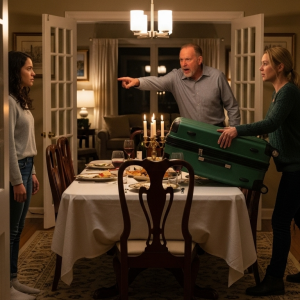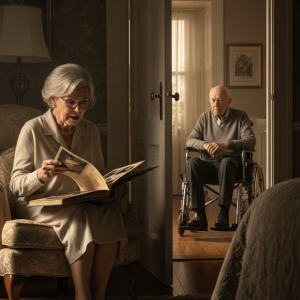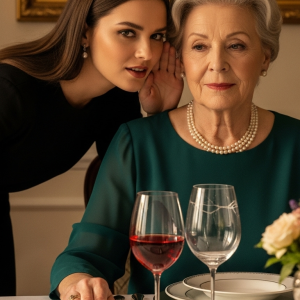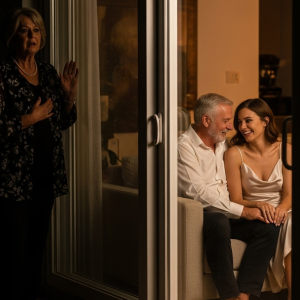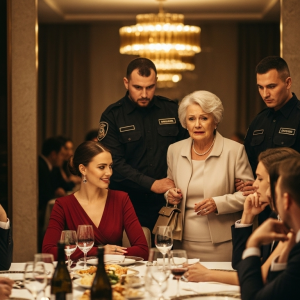I don’t remember the exact date, but I remember the cold. It was late fall in 2004, and a type of cold that crept under your skin and settled into the parts of you that you didn’t yet know could break. I was nine years old, sitting on the living room floor, coloring quietly while my parents argued in the kitchen. I’d learned to make my breathing shallow, to fold myself into the corner of the room until my edges blurred with the wallpaper. I learned to be invisible.
But that morning, their voices were sharper. Then, I heard my name.
“She’s a curse, Arless!” my mother snapped, her voice a whipcrack of resentment. “Ever since she was born, everything’s gone to hell!”
“She was never supposed to be here!” he shot back. “We were fine before she came. I lose my job, we lose the baby… It’s like she brings it all down on us!”
I froze, the red crayon still in my hand. I wasn’t supposed to hear that, but I don’t think they cared. The walls in that house didn’t keep much out, especially not words like curse, bad luck, or mistake.
That afternoon, my mom called me into the hallway. Her face was a blank mask. “Go pack a bag,” she said.
“For how long?” I asked, thinking it was a sleepover. She didn’t answer. I packed my favorite jeans, a hoodie, and a small stuffed rabbit named Penny, tucking her deep into the corner of my backpack.
The drive was silent. She pulled up in front of my grandparents’ house, the engine still running. “Get out,” she said, not looking at me. I stared at her, waiting for her to laugh, to say it was a joke. She didn’t.
I stood on the front step, a step I’d crossed a hundred times, but never like this. My grandfather cracked the door open. “Taran? What are you doing here?”
I tried to speak, but my voice was gone. My mom’s car was already pulling away. He sighed, a sound heavy with a weariness I didn’t understand. “We can’t go against your parents, honey.” He left the door open just long enough to hand me a blanket, then he closed it. Gently, but firmly.
Hours passed. The sun dipped below the rooftops. The air grew sharp. That’s when I heard a voice. “Taran?” It was Mrs. Lenora, the neighbor from across the street. She rushed over, took one look at my face, and ushered me into her warm, cinnamon-scented house without a single question.
That night, something shifted inside me. Not a snap, but a slow, quiet unhooking. The part of me that believed I belonged somewhere simply let go. I was only nine, but I knew what abandonment sounded like. It was the click of a car door, the hum of an engine driving away, and the profound silence that follows when you realize no one is coming back.
By the time I turned ten, the silence had a weight. It clung to me in the back rows of every classroom. At school assemblies, my name would be called for the honor roll or a poetry contest, and no one would clap from the audience. Everyone else had someone waiting in the wings. The empty chair was no longer an accident; it became mine.
But I kept trying. I wrote letters, drew cards, slipped them into the small blue box Lenora used for outgoing mail. Hi Mom, I hope you’re okay. I’m doing well in school. I miss you. I thought maybe, somehow, they would feel the intention.
One afternoon, Lenora pulled me aside, holding a stack of my returned envelopes. “Sweetheart,” she said softly, “these all came back. ‘Return to Sender.’ They don’t live there anymore.”
I stared at my own childish cursive on the worn envelopes. I didn’t cry. I just nodded and took them back. That night, I lined them up on my floor like wounded soldiers. That was when I stopped writing.
Lenora never said, “They’re not worth it.” Instead, she gave me a sentence that became a foundation. “Some people,” she said, her voice full of a sad, honest wisdom, “break what they can’t control.”
I let go little by little. I joined the yearbook committee, not for friends, but because I could be useful without being seen. I wrote one last card after winning an academic award. I got another one. You still didn’t come. But I stopped expecting you to. I walked it to the mailbox, tore it into tiny pieces, and dropped them into the trash. “I get it now,” I whispered to the wind. It wasn’t a thunderous epiphany, but something heavy inside me began to lift, making room for air again.
The rage didn’t come until I was fifteen. It started on an ordinary summer afternoon, helping Lenora clean out an old kitchen cabinet. Between yellowed newspaper clippings, I found a thick manila envelope with my name handwritten on it. Inside were bank statements and a note in my grandmother’s looping cursive: This is yours. I set it aside when you were born. You deserved something of your own.
It was a savings account, started with $500 the year I was born. Over time, it had grown to just over $12,000. To a girl with nothing, it was a fortune. I flipped to the last page. Balance: $0.00. Withdrawal Date: Two weeks after I was left on the doorstep.
Lenora saw my face drain of color. She sat beside me, placing a steady hand on my back. The withdrawal slips were there, signed with the familiar names of my parents. They didn’t just abandon me. They cleaned me out. Quietly. Legally. Completely.
It wasn’t grief I felt, or even fear. It was a steady, quiet rage. Not the kind that burns everything down, but the kind that builds something better just to prove it can be done. The next morning, I sketched a new version of a childhood drawing—the same little girl, but this time she was walking toward an open door. No one stood inside, no one waited. It didn’t matter. The door was open. Beneath it, I wrote in capital letters: START HERE.
That afternoon, I walked to a local café and asked for a job application. The woman behind the counter sized me up. “You’re a little young, but you look like you mean business.”
I nodded. “I do.” They took my name off their list, but I was writing it back into the world, one page at a time.
My high school graduation was the final, polite act of erasure. I was top three in my class, but you wouldn’t know it from the program. My name wasn’t listed under Top Achievers or Future Leaders. It wasn’t listed at all.
Lenora and I were directed to a table in the back corner, next to the kitchen doors, labeled with a simple paper sign: OVERFLOW SEATING.
The ceremony began. Names were called. Honors were bestowed. Mine was skipped. Not mispronounced, not fumbled—skipped. I kept my expression neutral. I clapped when expected. I smiled at the right faces. When the closing remarks began, I stood quietly and walked out. I didn’t make a scene. I just left.
I paused near the exit, glanced back once, not for them, but for me. To remember what it felt like to be erased so politely it almost looked like a favor.
That night, in my room, I unfolded the speech I’d written when I still thought my name would be called. I whispered the last line aloud to the quiet. “I may not be your top student tonight, but I’ll be the name you never forget.” I folded it back up and tucked it away. From that night forward, I stopped waiting for stages they’d never let me stand on. I would build my own.
I spent that summer in Lenora’s spare room, which became my office. I didn’t know how to build a company, but I knew what was needed. OpenVest started as an idea: a digital resource for kids like me, the ones who didn’t know how to apply for college or rent an apartment because no one had ever taught them.
I spent my days at the public library, taking free coding classes, and my nights scrubbing floors at a 24-hour gym. My clothes smelled like lemon cleaner or bacon grease, but I was building something no one could take away.
OpenVest went live with a simple landing page and three resource guides. I shared it anonymously on a foster care forum. A week later, a comment appeared: “This is exactly what I needed 2 years ago.” That was all it took.
One day, a tech blogger featured me in a “Young Innovators” segment. The article was picked up by a national magazine. I saw my face, my name, under a bold headline: The Founder Who Made Herself from Nothing. I closed the browser and went home. My phone remained silent. No texts from my parents. No emails from old teachers. The silence wasn’t sharp anymore; it was structure.
Twenty-one years after they left me on that doorstep, they returned. Not in person, but through a cream-colored envelope from a law firm. Inside was a formal request for “educational support.” Through legal counsel, my parents were asking me to pay for my younger brother’s college tuition.
The letter cited, in exact words, “the years they raised and supported me” as justification.
It wasn’t the money that made my hands tremble. It was the rewrite. The casual, breathtaking audacity of erasing their abandonment and replacing it with a fiction of parental devotion.
Then came the email from my uncle. Taran, we all do things we don’t want to for the sake of family. Blood matters. It’s your turn to give back.
The venom was in the assumption that I still belonged to them, that my success was a resource they were entitled to.
I printed the letter and the email. On a sticky note, I wrote in bold, steady letters: MY SILENCE IS NOT AN AGREEMENT. IT’S A BOUNDARY. I filed them away and called my lawyer. I wasn’t just erased anymore. I was being repurposed as a bank account.
What they couldn’t have known was that two weeks earlier, a dusty VHS tape had arrived at my door. A neighbor had recorded it all: me, nine years old on the porch, my father’s voice clear as day, “You don’t live here anymore,” the slam of the car door, the crunch of gravel as they drove away.
When my journalist friend Rachel saw the footage, she was silent for a full minute. “You want to go public?”
“No,” I said. “I want them to see I’m not afraid of the truth anymore.”
We recorded my statement. No dramatic lighting, just me in my office, looking into the lens. “This isn’t revenge,” I said calmly. “This is record-keeping. For every child who was told they were the problem.”
I posted the clip. Within 24 hours, it had over three million views. The comments were not of pity, but of solidarity. Days later, an email arrived from my parents’ lawyer: We are open to resolving this matter privately.
I didn’t respond.
The final confrontation happened in the parking lot of my own company. They just showed up one evening, my mother looking older, my father a few steps behind her.
“You’ll always be my daughter,” she said, her voice cracking as she stepped forward to hug me.
I raised a hand, not forcefully, just enough, and took a step back. She froze. “I wasn’t afraid,” I told her later, describing the moment. “I just didn’t want it.”
She tried to sell me an illusion of a mended family, one she refused to admit she had broken.
That’s when I finally answered. “This success means I finally understand what family actually is. And what it isn’t.” I didn’t yell. I didn’t cry. I simply said, “Thank you for coming by. You’re free to go now.”
I turned and walked back toward the gleaming glass building, my building, and didn’t look back. Closure hadn’t come when they apologized. It came when I realized I didn’t need them to. This time, I wasn’t a little girl standing on a doorstep hoping for love. I was a woman holding the key to my own home.
